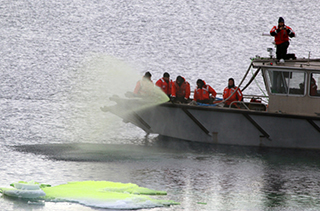Pollution responders on the lower Mississippi River had a near-fatal emergency of their own, when two spill response vessels recently collided at a combined speed of nearly 70 mph. The accident seriously injured 15 workers, and prompted the Coast Guard to issue a safety alert saying the industry needs to employ “knowledgeable operators with appropriate seamanship skills” to run their boats.
The accident happened in the dark of evening, when 30’ vessel was northbound on the river with its operator and 17 people from spill response groups on board. The operator was not licensed, nor familiar with the Inland Rules of the Road, according to a narrative of the case from the Coast Guard Inspections and Compliance Directorate in Washington, D.C. More details of the incident were not immediately available from the Coast Guard Eighth District office in New Orleans.
Heading southbound was a 36’ spill response boat, this one with a licensed operator at the helm and another worker on board. But neither operator was using their radar or had a posted lookout, and witnesses told investigators the southbound vessel did not have its bow lights on.
“As the vessels approached each other, the southbound vessel operator noticed the red bow light of an oncoming vessel, and turned towards starboard in accordance with the Rules of the Road, while the northbound vessel saw just a black silhouette and turned towards port,” according to the Coast Guard report. “A few moments later, the vessels collided as the northbound vessel’s starboard bow corner struck the southbound vessel’s square front bow.”
The impact left those on board with multiple head, neck and back injuries that required on-scene triage by emergency medical personnel and transport to local hospitals. Had the angle of impact been different, there very likely would have been deaths, investigators reported.
“As a result of this casualty the Coast Guard strongly recommends that all pollution response companies and other industries that operate special purpose vessels without licensed or credential mariners do the following,” the paper concludes:
“Develop policies and hiring prerequisites that require all boat operators to attend a formal boating safety course which includes basic Inland Rules of the Road.
“Critically examine boat operations to determine if sufficient attention has been given to the safety of company employees and other personnel who are transported or work onboard their vessels.”




